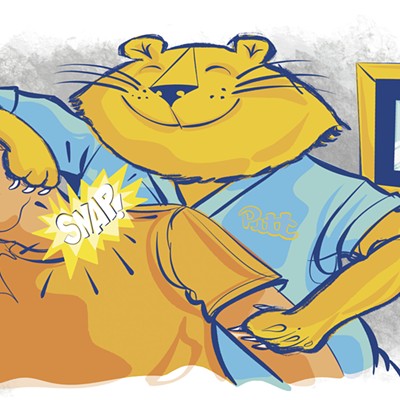When Travis Williams of the Pittsburgh Penguins stood before a roomful of Hill District residents April 10 to discuss the team's plans for the Lower Hill District for the first time, he said out loud what nearly all in the room knew to be true.
"It would be easy for me to stand up here and say, ‘Trust us,'" the team's chief operating officer told the crowd of about 120. "I certainly understand how far that would go."
The Pittsburgh Penguins, who have been granted the exclusive rights to develop the city-owned site of the former Civic Arena, are working on a master plan for the 28 acres of prime real estate between Bedford Avenue and Centre Avenue, just east of Downtown.
While the team was not yet in the picture in the 1950s, when city planners embarked on a redevelopment plan that included construction of the arena and the demolition of a large section of the Hill District, the Penguins now hold the responsibility for ensuring the next redevelopment of the Lower Hill doesn't make the same mistakes.
For the Penguins' part, team representatives say they are mindful of the past.
"We're taking that history and thinking about what are the key things," says Craig Dunham, president of Dunham reGroup, a consulting firm hired by the Penguins.
Those include a partial return to the street grid that once helped define the vibrant African-American neighborhood, extending Wylie Avenue again from Crawford Place to Washington Place and adding two new cross streets connecting Bedford and Centre avenues.
The proposed street grid also connects the Hill District to Downtown again, adding a pedestrian walkway and park on a bridge over I-579. The park would be one of three green spaces envisioned within the site, which will be a mix of residential and commercial.
The urban-redevelopment project of the '50s was "a project intended to take away a community," Williams says. "This is, in our mind, a move back to creating communities where people want to live, work and play."
The Penguins' plans are to be formally submitted to Pittsburgh City Council and the city's Planning Commission in the coming weeks. In the meantime, in presentations to Hill District residents, team representatives are seeking the community's endorsement of their ideas for ensuring the Hill's cultural legacy is protected.
But mistrust does indeed underlie the discussions, particularly when talk turns to how much direct benefit Hill District residents will see from the project.
Robert Bowden, a community organizer with the Hill District Consensus Group, says part of the problem is the framing of the issue.
"The residents of the Hill District want the development to reflect an extension of the Hill going [into] Downtown. The developers, obviously, want this framing to be Downtown extended outward," he says.
Solutions vary: Some community leaders — such as City Councilor Dan Lavelle — are putting an emphasis on ensuring Hill residents get jobs from the development work expected to occur over the next 10 years, as well as opportunities to locate businesses in the new development.
"The Lower Hill development has the opportunity to do for Pittsburgh what the redevelopment of the airport did for Atlanta — create generational wealth opportunities," Lavelle says.
Others are pressing for something more immediate and more tangible: The Hill District Consensus Group is leading a grassroots campaign urging the city to require the Penguins to dedicate $1 per car in parking revenue to a Hill District community-improvement fund to be used for services such as youth programs and job training.
The Penguins do not favor that idea, Williams says, adding it would be only a short-term fix at best. He says the Penguins will not have the parking rights once development begins. But, he says, he hopes to build trust, little by little, as the process moves forward.
"A lot of the ideas and expectations are great ideas, and we want to fulfill as much of that as we can," he says. "But we also have to balance that against bringing development to the table. If you put so many demands into the pot and a developer can't fulfill those or it becomes unreasonable, the development won't be here and nobody benefits.
"It stays a parking lot."














